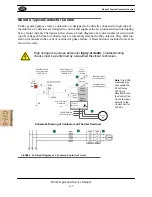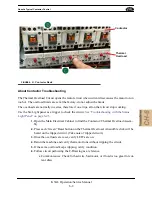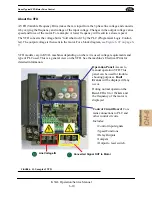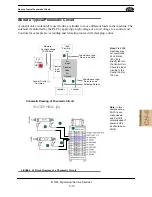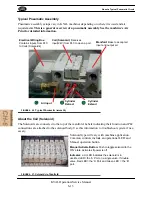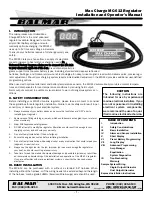
About Switches and Sensors
6-21
KVAL Operation/Service Manual
About Switches and Sensors
On the Machines, the sensors and limit switches provide input to the PLC as part of the automa-
tion of the door cutting process. Inputs can include feed through, door clamping, door location,
and limits of movement of machine assemblies.
Sensors are electronically tripped while limit switches are mechanically tripped. It is important to
keep the sensors cleaned and aligned to keep the door process running smoothly. There are two
classifications of sensors: Photo Electronic and Inductive Proximity Sensor.
The
Photo Electronic Detector
uses light as a trigger.
•
Photo Eye Detectors
contain both emitter and receiver.If an
object is within the Photo Eye’s sensing field light from the emitter
is reflected from the object back to the receiver. With
no object
is
in front of the Photo Eye a constant 24VDC is sent to the PLC. If
an object is sensed by the Photo Eye, 0VDC is sent to the PLC.
• As a result, any of the photo detectors output equals 0VDC when a
door is sensed.
• Some detectors have an emitter and receiver built in one unit, such
as an in-feed sensor where a door blocks the light and reflects back
to the unit.
• Some detectors have an emitter and receiver built in separate units, such as the
through beam sensor set at a distance from each other. If an assembly is in between
the two sensors the machine will not operate.
One Package
The
Proximity Sensor
detects metallic objects without touching them.
• An inductive proximity sensor consists of a coil and ferrite core
arrangement, an oscillator and detector circuit, and a solid-state
output. The ferrite core and oscillator create a field generating out
the front of the sensor. When a metal object enters the field, a loss
in amplitude occurs. The detector circuit recognizes the
loss of amplitude and generates 0VDC to send to the
PLC. When the metal object leaves the sensing area, the
sensor to returns to 24VDC and sends it to the PLC.
• As a result, if a metal object is sensed, the output of the
sensor equals 0VDC
Sensors on Piston and Cylinder
Summary of Contents for Edge-SS
Page 5: ...KVAL Edge SS Operation Service Manual ...
Page 12: ...KVAL Edge SS Line Operation Service Manual ...
Page 32: ...Safety Sign Off Sheet 1 20 KVAL Operation Service Manual ...
Page 35: ...Definitions 2 45 KVAL Operation Service Manual ...
Page 91: ...Definitions KVAL Operation Service Manual 2 56 ...
Page 109: ...System IT Administration 4 4 KVAL Operation Service Manual ...
Page 142: ...Collet Torque Values 5 33 KVAL Operation Service Manual ...
Page 143: ...Troubleshooting Electrical Problems 6 30 KVAL Operation Service Manual ...
Page 173: ......
Page 177: ......
Page 178: ......
Page 179: ......

